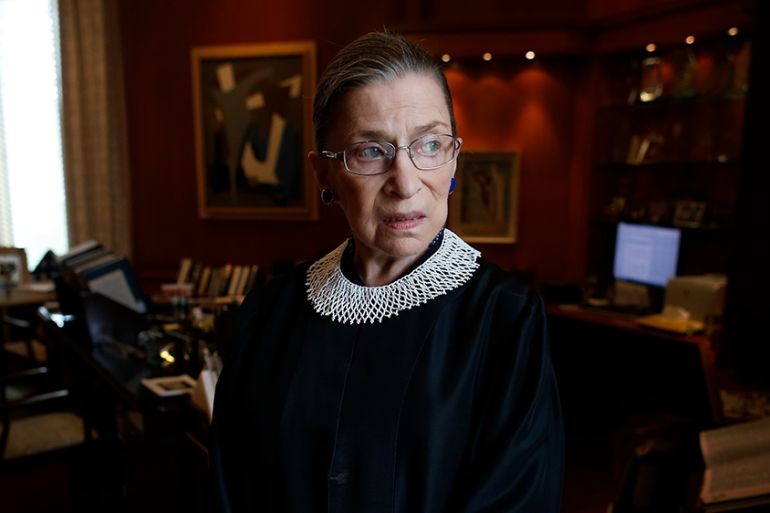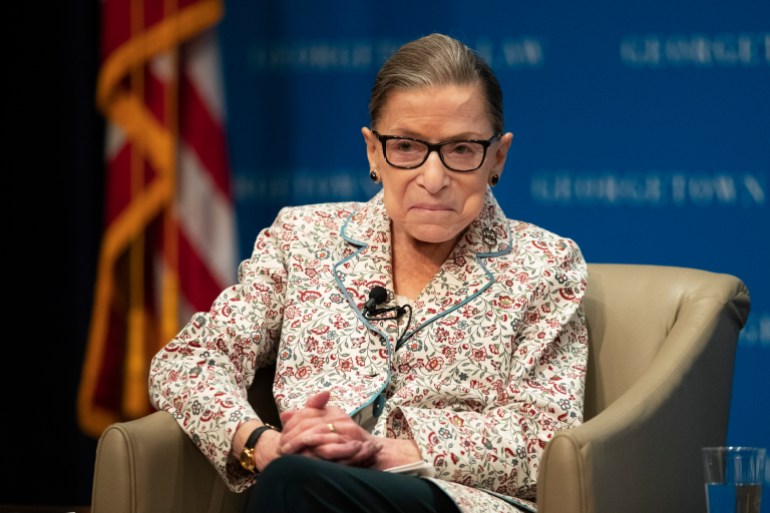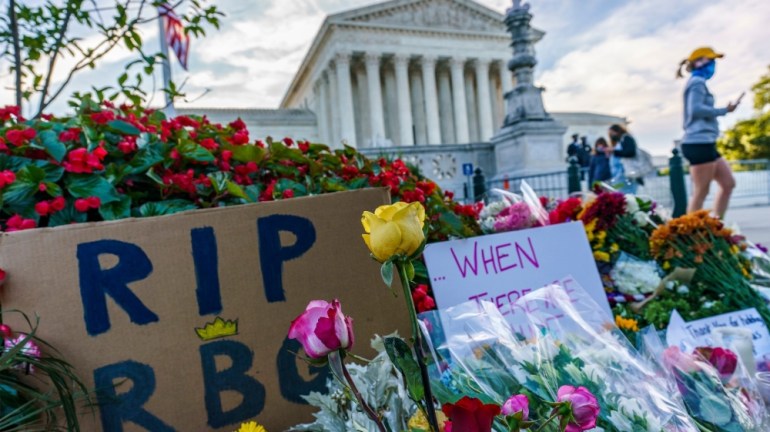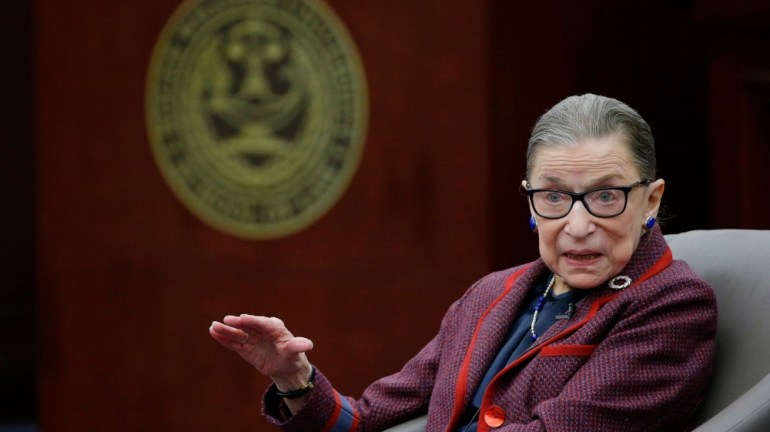Ruth Bader Ginsburg: A life in pursuit of gender equality
Bader Ginsburg’s voice for the ‘excluded and oppressed’ in gender and immigration cases will be missed.

Ruth Bader Ginsburg, who became the second female United States Supreme Court Justice in 1993, devoted much of her career to advancing women’s rights. The impact of her judgements and dissents on gender equality, reproductive rights and immigration matters will reverberate long after her death, say experts.
After Ginsburg’s death on Friday, Domingo Garcia, national president of the League of United Latin American Citizens, said: “She was well aware of her place in history as one of the voices for the excluded, the oppressed and those trying to find real justice.”
Keep reading
list of 4 itemsTen years after Chibok girls kidnapping: One woman’s struggle to move on
Poland lawmakers take steps towards liberalising abortion laws
Arizona’s top court allows near-total 1864 abortion ban to go into effect
Ginsburg has been described as a “feminist icon”. Upon her faculty appointment at Columbia Law School in 1972, Ginsburg said: “Sexual discrimination is and will continue to be my principal interest.”

Hiring women
When Ginsburg was hired by Columbia University after a string of rejections because of her gender, she stressed the importance of hiring women for senior legal positions.
She said her appointment as the first female tenured law professor at the school “reflects a serious effort on the part of Columbia Law School to hire more women” and added “I know that I am not just a token. I expect that I will be the first of many women the law school will have.”
Kim Thuy Seelinger, professor of law at Washington University and expert on gender-based violence, told Al Jazeera: “The fact that Ginsburg kept excelling and kept fighting for gender and racial equality despite her personal struggles is tremendously inspiring to me, a female lawyer of colour in the United States. I suspect women of many backgrounds feel the same”.
Gender equality battles
Ginsburg led the legal fight for gender equality in the US from the early 1970s. At the time, hundreds of federal and state laws in the US discriminated against women.
In 1971 she wrote her first brief for the Supreme Court in Reed v Reed, a case involving the constitutionality of an Idaho statute that stated “men must be preferred to females” in executing estates.
The court decided that the statute was unconstitutional. This was the first case in which the Supreme Court struck down a state law on the basis of gender discrimination.
In 1972 Ginsburg joined the American Civil Liberties Union (ACLU), a non-profit organisation that supports civil liberties through litigation and lobbying. She was the founding director of the group’s Women’s Rights Project.
During her time at the ACLU she argued six cases before the Supreme Court and won five. Many of her early cases involved sex discrimination against men, towards which she thought judges at the time might be more sympathetic.
During her first oral argument before the Supreme Court in 1973, in the Frontiero v Richardson case in which she challenged the assumption that a man is not likely to be a dependent spouse, she quoted Sarah Grimke, a 19th-century abolitionist and suffragette: “I ask no favour for my sex. All I ask of our brethren is that they take their feet off our necks.” Her argument prevailed in what became known as a landmark case on gender equality.
In 1996 Ginsburg wrote the majority opinion in the case United States v Virginia, declaring that the Virginia Military Institute, a public military college, could no longer remain an all-male institution. The lawsuit was heralded as the beginning of a new era in gender-based equal protection cases.
“Everybody working on women’s legal rights in the 1970s knew that Ruth’s litigation was of central significance. It enhanced our ability to attract outstanding legal talent for our work. It also helped build a strong feminist caucus on the board,” said Aryeh Neier, the former executive director of the ACLU who appointed Ginsburg.

Reproductive rights
Ginsburg was also known for her support of reproductive freedom.
In a Supreme Court ruling in July, Ginsburg and Justice Sonia Sotomayor were the only judges to disagree with a ruling that would allow any company to get out of government-mandated insurance for contraception if the employer had a moral or religious objection to it.
In her lengthy dissent in this case, Ginsburg noted that tens of thousands of women would possibly lose their contraception coverage. She wrote: “a religious adherent may be entitled to religious accommodation with regard to her own conduct” but she is not entitled to force others to conform to her conduct.
In the wake of Ginsburg’s death, many are concerned that the landmark 1973 Roe v Wade case, which protects a woman’s right to choose to have an abortion in the US, could be overturned by justices appointed by US President Donald Trump.
There is widespread concern in liberal circles that if Ginsburg is replaced by a conservative judge on the court, it would leave supporters of abortion rights outnumbered. There was already a five-to-four majority of anti-abortion judges on the Supreme Court before Ginsburg’s death. If Trump appoints a judge – presumably one who opposes abortion – the number of anti-abortion judges would rise to six.
“The fate of our rights, our healthcare, our bodies, our lives and our country depend on what happens over the coming months,” Alexis McGill Johnson, the head of Planned Parenthood, said on Friday.
“While her record as a lawyer, professor and justice reflects that she was a long-committed advocate on abortion rights because she believed these rights involve critical life decisions that should be made by each woman for herself instead of by the state, Ginsburg’s scholarly writing also reflects her broader institutional concerns about Roe v Wade’s sweep and the need to ensure political support on these important social questions,” Ruti Teitel, professor of law at New York Law School, told Al Jazeera.
‘Great dissenter’
Well-known for her searing dissents, Bader Ginsburg became known as “the great dissenter”. A dissent is the opinion of a judge who disagrees with the majority opinion.
When, in 2007, the court ruled against Lilly Ledbetter – who had been paid less than male colleagues in comparable jobs at the Goodyear Tire & Rubber Company – Ginsburg dissented. Her dissent eventually led to the adoption of the Lilly Ledbetter Fair Pay Act by President Barack Obama in 2009.
Seelinger says: “Ginsburg understood that even if the Supreme Court majority could not or would not offer the protection sought, judges in the minority could still call for Congress to resolve the issue outside the Court. This is what happened in the Ledbetter case.”

Immigration cases
With the new Supreme Court term due to start on October 5, Ginsburg’s absence could change the trajectory of issues she championed such as gender and immigrants’ rights.
Her absence on the court could affect Trump’s efforts to exclude undocumented immigrants from the 2020 US Census count of every person in the country, which is politically significant since it will be used to allocate seats in Congress.
Trump has been accused of “weaponising” and “manipulating” the census against immigrant communities. It is argued that the exclusion of undocumented immigrants from the congressional reapportionment consideration could benefit Republicans electorally.
In recent months Ginsburg was still actively protecting the rights of the vulnerable. In July she was one of the justices who upheld the Obama-era Deferred Action for Childhood Arrivals (DACA) programme.
DACA is a US immigration policy that protects eligible immigrant youth who came to the US when they were children from being deported. In 2017 Trump attempted to end the programme.
In the coming months, the Supreme Court will be faced with an immigration case that could affect the fate of 700,000 young people who could face deportation should DACA be abolished.
A ‘less smart and less decent’ court
Gregory Magarian, professor of constitutional law at Washington University in St Louis, told Al Jazeera: “Justice Ginsburg will leave a great hole on the court. She was the most senior justice on the court’s more liberal wing, and she never hesitated to push back against the court’s conservative majority. The court will be less smart and less decent without her.”
Neier agrees: “If Trump gets to pick Ruth’s successor, it will consolidate right-wing control of the court for the foreseeable future. The consequences for civil liberties will be disastrous. I can’t begin to spell them out.”